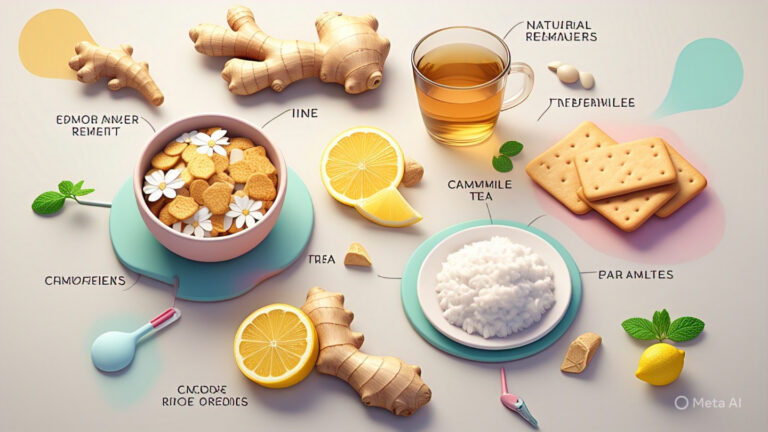Home Remedies for Gum Swelling: Your Ultimate Guide to Natural Relief
Estimated reading time: 10 minutes
Key Takeaways
- Gum swelling is a common issue often caused by gingivitis, infections, or poor hygiene.
- Natural remedies like saltwater rinses and turmeric can ease mild swelling effectively.
- Know when to seek a dentist—persistent pain or swelling beyond 72 hours needs professional care.
- Safe use of home fixes requires following guidelines to avoid risks like irritation.
- Daily oral habits are your best defense against recurring gum issues.
Table of Contents
- Introduction to Gum Swelling and Natural Solutions
- What Causes Gum Swelling? Understanding the Root Issues
- Home Remedies vs. Professional Care: When to See a Dentist
- Top 10 Evidence-Based Home Remedies for Gum Swelling
- How Do These Remedies Work? The Science Behind Natural Solutions
- Daily Oral Care Routine to Prevent Gum Swelling
- Safety Precautions When Using Home Remedies
- Frequently Asked Questions (FAQs) About Gum Swelling Remedies
- Additional Resources for Gum Health
Introduction to Gum Swelling and Natural Solutions
Gum swelling can be a frustrating issue, causing discomfort and worry for so many people. Whether it’s a dull ache or visible puffiness, this common oral health concern often disrupts daily life. At WikiHomeRemedies, we understand how unsettling this can be and are here to help.
Home remedies offer a gentle, accessible way to find relief right from your kitchen. These natural solutions are often cost-effective and can ease pain while you assess the situation. Our mission is to guide you with trustworthy, evidence-based information rooted in research from sources like the National Institutes of Health (NIH) and the American Dental Association (ADA).
Did you know that over 40% of adults experience gum issues at some point, according to ADA reports? This shows how widespread the problem is. In this article, we’ll walk you through practical, step-by-step natural remedies to soothe swelling fast and help you decide when it’s time to seek a dentist’s care. Let’s dive into understanding this condition and finding relief together.
What Causes Gum Swelling? Understanding the Root Issues
Gum swelling isn’t just a random annoyance; it often signals something deeper happening in your mouth. Knowing the root cause helps you pick the right approach to ease the discomfort. It might stem from everyday habits or underlying health conditions worth paying attention to.
Several factors can lead to this issue. Let’s break them down:
- Gingivitis: This early stage of gum disease, often due to plaque buildup, is a leading trigger. Studies from the NIH show it affects nearly half of adults.
- Periodontal Disease: A more advanced form of gum issues, leading to inflammation and potential tooth loss if ignored.
- Infections: Bacterial or viral infections can irritate gums, causing puffiness and pain.
- Hormonal Changes: Pregnancy or other shifts can make gums more sensitive and prone to swelling.
- Poor Oral Hygiene: Skipping brushing or flossing lets harmful buildup inflame tissues.
- Injuries or Medications: Trauma or specific drugs may irritate gums as a side effect.
Symptoms often include redness, tenderness, or even bleeding while brushing. You might notice pain, bad breath, or a puffy appearance. Pinpointing these signs and their origins is key to deciding whether a simple home fix will work or if professional help is needed. Let’s explore that balance next.
Home Remedies vs. Professional Care: When to See a Dentist
Navigating gum swelling can feel tricky, but knowing when to try a natural fix or call a dentist makes all the difference. Home remedies work well for mild, short-term swelling that doesn’t come with alarming signs. They can calm discomfort while you monitor things closely.
However, some situations demand expert care to prevent bigger problems. Watch for these warning signs that mean it’s time to book an appointment:
- Swelling lasting over 72 hours despite home efforts.
- Intense pain that disrupts eating or sleeping.
- Fever or visible pus around the gums.
- Difficulty chewing or opening your mouth.
Delaying help for issues like an abscess or severe gum disease can worsen outcomes. The American Dental Association suggests seeking care within a few days for persistent symptoms. At WikiHomeRemedies, your safety is our priority. We encourage using natural solutions wisely but always urge caution when something feels off. Let’s move on to remedies you can try for milder cases.
Top 10 Evidence-Based Home Remedies for Gum Swelling
Finding relief from gum swelling doesn’t have to mean a trip to the store or pharmacy. Nature offers powerful tools right at home, backed by tradition and science. Below, we’ve gathered ten remedies with clear steps to help you soothe pain and reduce inflammation safely.
Saltwater Rinse
A saltwater rinse is a timeless solution for oral woes. It draws out fluids from swollen tissues and fights bacteria. This simple mix can bring quick comfort.
- Dissolve ½ teaspoon of salt in 8 ounces (about 240 ml) of warm water.
- Swish gently in your mouth for 30 seconds, then spit out.
- Repeat 2–3 times daily until swelling eases.
- Avoid swallowing the mixture to prevent excess sodium intake.
Cold and Warm Compresses
Temperature can be a game-changer for gum discomfort. Cold reduces puffiness, while warmth boosts blood flow to heal. This duo tackles symptoms from two angles.
- For cold: Wrap ice in a cloth and press against the cheek near swollen gums for 10 minutes.
- For warm: Soak a clean cloth in warm water, wring it out, and apply similarly.
- Alternate every few hours, but don’t place ice directly on skin.
- Use for 1–2 days as needed.
Turmeric Gel
Turmeric holds curcumin, a compound known for calming inflammation. Studies from the NIH highlight its potential in oral care. It’s a vibrant ally for swollen gums.
- Mix 1 teaspoon of turmeric powder with a few drops of water to form a paste.
- Apply gently to affected gums using a clean finger or cotton swab.
- Leave for 5 minutes, then rinse with lukewarm water.
- Do this twice daily, avoiding overuse to prevent staining.
Aloe Vera
Aloe vera’s cooling gel soothes irritation and promotes healing. Its natural properties help tame swelling with a gentle touch. Many turn to this plant for skin and gum care.
- Extract fresh gel from an aloe leaf or use pure store-bought gel.
- Rub a small amount onto swollen areas with clean hands.
- Leave for 10 minutes before rinsing with water.
- Repeat 2 times a day, ensuring no allergies exist by testing on skin first.
Tea Tree Oil
Tea tree oil carries strong antibacterial power, often noted in NIH research for tackling oral pathogens. It can curb infection-related swelling when used carefully. Dilution is crucial here.
- Add 2–3 drops of tea tree oil to a teaspoon of carrier oil like coconut oil.
- Dab onto gums with a cotton swab, avoiding direct contact with undiluted oil.
- Rinse after 5 minutes with water.
- Use once daily and never swallow, as it’s toxic if ingested.
Clove Oil
Clove oil, with its eugenol content, numbs pain and fights germs. It’s been a go-to in traditional remedies for oral issues. A little goes a long way for gum relief.
- Mix 2 drops of clove oil with 1 teaspoon of olive oil.
- Apply to swollen gums using a cotton ball or swab.
- Leave for 5–10 minutes, then rinse thoroughly.
- Use once or twice daily, avoiding overuse to prevent irritation.
Oil Pulling with Coconut Oil
Oil pulling, especially with coconut oil, clears bacteria and soothes gums. Its lauric acid content supports oral health, as per small studies. It’s an ancient practice worth trying.
- Take 1 tablespoon of coconut oil and swish in your mouth for 10–15 minutes.
- Spit into a trash can, not the sink, to avoid clogs.
- Rinse with warm water afterward.
- Do this once daily, preferably in the morning.
Chamomile Tea Rinse
Chamomile brings a calming effect with anti-inflammatory benefits. Often backed by traditional use and NIH mentions, it’s ideal for a gentle rinse. Sip or swish for relief.
- Steep 1 chamomile tea bag in a cup (8 oz or 240 ml) of hot water for 5 minutes.
- Let it cool to lukewarm, then swish for 30 seconds.
- Spit out and repeat 2–3 times a day.
- Ensure the tea isn’t too hot to avoid burns.
Baking Soda Paste
Baking soda neutralizes harmful acids and reduces swelling with its mild abrasive nature. It’s a pantry staple for oral care when used sparingly. Overdoing it risks enamel wear.
- Mix 1 teaspoon of baking soda with a few drops of water into a paste.
- Apply to gums with a clean finger, focusing on swollen spots.
- Rinse after 2–3 minutes with water.
- Use only once every other day to protect enamel.
Ginger Paste
Ginger’s natural compounds ease inflammation and fight bacteria. Its warming effect, noted in traditional healing, comforts irritated gums. Fresh ginger works best for this fix.
- Grate a small piece of fresh ginger and mix with a pinch of salt.
- Rub gently on affected gums with a clean finger.
- Rinse after 5 minutes with lukewarm water.
- Apply twice daily, stopping if irritation occurs.
These remedies harness nature’s gifts to bring you comfort. Use them mindfully, and remember they target mild cases. Next, let’s uncover how these solutions actually work their magic.
How Do These Remedies Work? The Science Behind Natural Solutions
Ever wondered why these natural fixes help with gum swelling? It’s not just folklore—there’s real science at play. Many of these ingredients target inflammation, bacteria, or pain directly, offering relief rooted in research.
Saltwater draws out excess fluid from tissues through osmosis while cleansing bacteria. Turmeric’s curcumin, as studied by the NIH, blocks inflammatory pathways in the body. Aloe vera’s gel hydrates and calms irritated areas with bioactive compounds. Tea tree oil and clove oil, with components like eugenol, disrupt bacterial growth and dull discomfort, supported by small-scale studies.
Chamomile reduces swelling through mild anti-inflammatory agents, often noted in traditional medicine. Coconut oil’s lauric acid tackles harmful microbes during pulling, while ginger’s bioactive elements soothe and protect. Baking soda balances mouth pH, curbing acid-driven irritation. These mechanisms, backed by sources like the ADA and WHO, underline why nature can be a powerful ally. Let’s now shift to keeping swelling at bay with daily habits.
Daily Oral Care Routine to Prevent Gum Swelling
Stopping gum swelling before it starts is easier than you might think. A consistent oral care routine builds a strong shield for your gums. Let’s walk through simple steps to keep them healthy.
Here’s a practical plan to follow every day:
- Brush Properly: Use a soft-bristled brush for 2 minutes, twice daily. Angle at 45 degrees to clean along the gumline, as the ADA advises.
- Floss Daily: Slide floss between teeth to remove trapped food and plaque. Do this gently to avoid gum cuts.
- Rinse with Water or Mouthwash: Swish after meals to clear debris. Opt for alcohol-free options if gums are sensitive.
- Eat for Gum Health: Choose vitamin C-rich foods like oranges to strengthen tissues. Cut back on sugary snacks that feed bacteria.
- Hydrate and Avoid Tobacco: Drink plenty of water to rinse your mouth naturally. Skip smoking, as it weakens gum defenses.
These habits tackle plaque and irritation before they escalate. Pair them with lifestyle choices like regular dental checkups for lasting results. Up next, let’s cover how to stay safe while using home fixes.
Safety Precautions When Using Home Remedies
Turning to natural remedies for gum swelling feels empowering, but caution keeps you safe. These solutions are often gentle, yet misuse or overuse can lead to unexpected issues. Let’s ensure you apply them wisely.
Some remedies carry risks if not handled properly. Baking soda, for instance, may wear down enamel if used too often, as noted by the ADA. Tea tree oil can irritate or cause reactions if undiluted or swallowed—WebMD warns of its toxicity internally. Even turmeric might stain teeth with frequent application.
A few tips help avoid pitfalls:
- Patch-test ingredients like oils on skin first to check for allergies.
- Stick to recommended amounts and frequencies for each remedy.
- Stop immediately if you feel burning or worsening discomfort.
- Remember, these aren’t cures for severe conditions—don’t skip dental care.
WikiHomeRemedies prioritizes your well-being. These tools complement, not replace, professional advice for deeper issues. Now, let’s address some common questions you might have about tackling gum swelling naturally.
Frequently Asked Questions (FAQs) About Gum Swelling Remedies
Gum swelling raises many questions, and we’re here to clear things up. Below, we answer common concerns with straightforward guidance to ease your mind.
How Long Does It Take for Gum Swelling to Reduce with Home Remedies?
For mild cases, remedies like saltwater rinses can reduce swelling in 48–72 hours. Consistency matters, so follow steps as outlined. If there’s no change after three days, a dentist’s input is wise.
Can Swollen Gums Heal on Their Own?
Minor swelling from irritation might subside with good hygiene over a few days. However, if it’s tied to infection or disease, healing won’t happen without action. Don’t wait if symptoms linger.
Are There Risks to Using Natural Remedies for Gum Swelling?
Yes, risks exist if remedies are overused or misused. Baking soda can harm enamel, and tea tree oil might irritate if not diluted. Always follow guidelines and test for reactions first.
What Should I Do If Home Remedies Don’t Work?
If swelling or pain persists beyond 72 hours, see a dentist promptly. It could signal a deeper issue like an abscess. Delaying care risks worse outcomes, per ADA advice.
Can I Use Multiple Remedies Together Safely?
Combining remedies like saltwater rinse and aloe vera is often fine if done hours apart. Avoid mixing potent ones like oils without guidance. Stick to one or two at a time.
Additional Resources for Gum Health
Your journey to healthier gums doesn’t stop here. WikiHomeRemedies wants to equip you with more tools and knowledge. Explore these trusted sources for deeper insights into oral care.
Check out resources from the American Dental Association (ADA) for expert tips on gum maintenance. The National Institutes of Health (NIH) offers studies on conditions like gingivitis. These platforms provide reliable information to support your health goals.
For related topics, browse other WikiHomeRemedies guides on preventing gum disease naturally. Note that we’re not affiliated with external resources or products mentioned. Use these as a stepping stone to build on what you’ve learned here about caring for your gums. If you’re dealing with related oral pain, check out our guide on home remedies for toothache or learn more about soothing hurting gums. For other oral concerns like thrush, explore our articles on remedies for thrush in the mouth and on the tongue.










